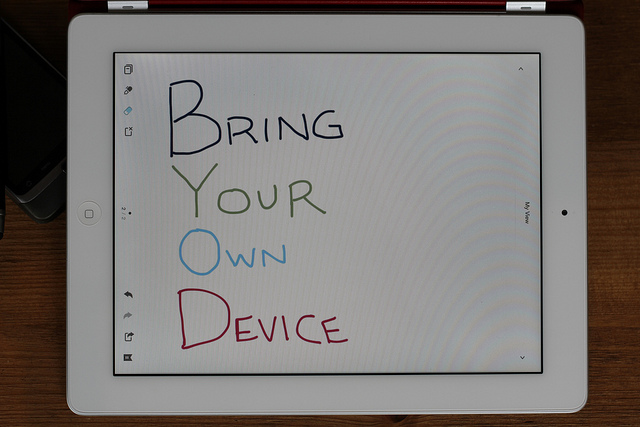Bring Your Own Device (BYOD) changing the essence of cloud
At Verizon Wireless ten days ago, I was asked whether I want to pay insurance for accidental damage on my Droid Bionic: $7,00 per month. Can you imagine owning a product that monitors BYOD support infrastructure costs and user satisfaction for each device, charging $1 per device per month? what about $5 per device per month?
People as employees are fed up with what their company provided tools can do. They bring in their own. The iPods, iPads, iPhones, iEverything made by Apple, Androids, Droids, Windows, and soon the new Firefox phone HTML5 to be marketed by Telefonica.
This is just the beginning, because what we call cloud is made up today more of mobile devices then servers.
Who manages those mobile BYOD in an enterprise now? Mostly nobody yet. However there are players that got the idea, like Mobile Iron BYOD solution. Their solution seems to cover everything, like device choice, user experience and privacy, trust, mobile application design and governance, liability and economics, etc.
Facebook has 500 millions of mobile devices and starting Friday, they have an application to send personalized adds to each mobile device. Twitter made 5x more revenues from mobile adds than desktop adds. The US economy 9x Africa's, but Africa has twice as many mobile phones. Africa has no servers and no corporate IT and any corporation must run as cloud .
I wrote in my entry about Google presentation at Cloud Slam '12
Google wants to transfer the incomparable cloud consumer behavior to the corporate world. Why Apple is a great company? Because of Steve Jobs? To some extent, but they are great because they cater to the consumer IT. There are now more than 6 billion (billions!) mobile subscriptions and 1.2 billions are 3G subscriptions.There a total of 2.2 billions subscribers at higher speeds, so the mobile 3G plus are more than a half .The cloud is not about moving old applications to the cloud (which IBM considered as a centric issue), but about creating new applications taking the advantage of the social and other services available out thereThis means BYOD will be part of the organic business model of an enterprise and there is no way back. See Facebook and Twitter above. One day, all enterprises will have at scale the similar challenge to make BYOD part of the profitability of the company
If any enterprise has an IT run by a CIO and staff of hundreds, sometime thousands people, they have to adapt their infrastructure to accept BYOD, and this cost money and headaches. There is a need for product research to determine the costs associated, but here are some metrics
There is no product today to deliver this information and do some analytics. The first question is: "Analitics for what?"
- Mobile Data Protection (MDP)
- Network Access Control (NAC)
- Mobile Device Management (MDM) tools
- BYOD satisfaction surveys
- Productivity metrics (TBD)
- Satisfaction Surveys
- ...
This is one of the reasons we should read Why I Like People with Unconventional Resumés. by Claudio Fernández-Aráoz:
I like candidates who have followed non-traditional career paths. That's why I look for people who have shown the penchant for personal disruption
This is why "people with a penchant for personal disruption" must be involved. I am a great supporter of Umair Haque eudaimonics, which preaches that the more happy people at work are, the more productive they are. And the more productive they are , the higher the profits will be. This is what a BYOD management system must achieve, and NOT the instinctive, short sighted goal of reducing costs that might cause user unhappiness.


Comments